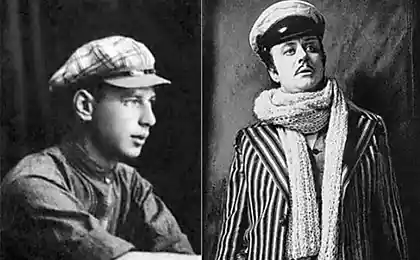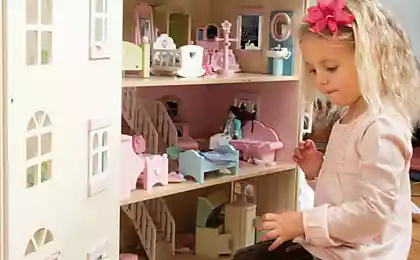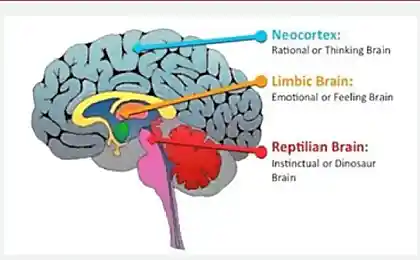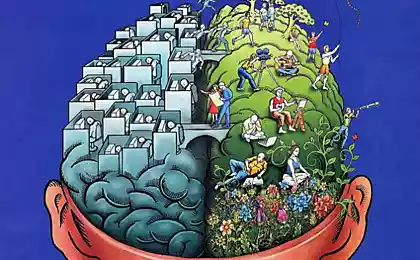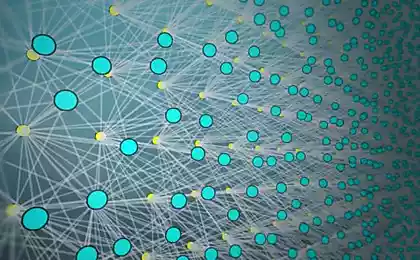594
Alan shore: boys need care more than girls
The wrong way is the usual hard education of boys "man up"We often hear that boys should be brought up severely, so that they do not become soft. Parental rigidity is defined as the "desire not to spoil the child." But it is a serious mistake! Such ideas are based on ignorance of how and why children develop. To grow and develop, children need caring sensitive adult about it — then, as an adult, he will have self-control, social skills and he will be able to take care of other people.
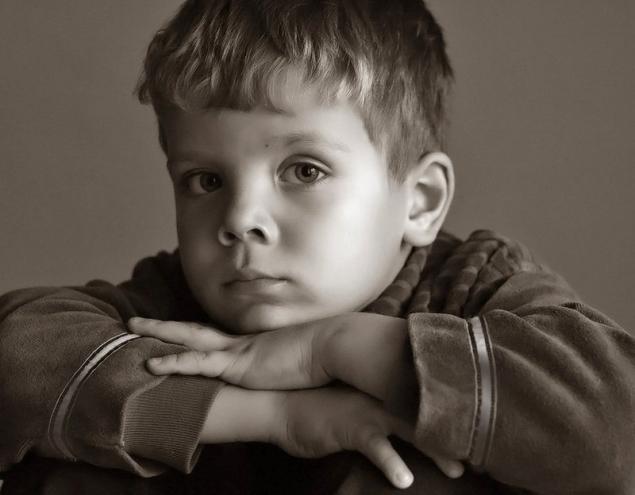
Recently, a clinical psychologist and neuropsychoanalysis Alan shore, the theory of which is based on data communication of neuroscience research and attachment theories, released a review of the empirical research under the title "Our sons: Neurobiology and neuroendocrinology of development of boys at risk," which described in details all the arguments in favor of a more careful attention to the boys.
Why does experience in early childhood affects the development of boys much more than girls ' development?

Why are boys harder?
Boys are more vulnerable to neuropsychiatric disorders that manifest at an early age (girls are more susceptible to disorders that emerge later). Such disorders include autism, early onset schizophrenia, attention deficit disorder with hyperactivity and conduct disorder. These trends intensified in recent decades (it is interesting to note that in these years, more children began to give in day preschools, many of which do not provide the appropriate needs of child care (national Institute of child health and human development, the Research community on early care for children, 2003).
Says shore, "whereas the slower development of the brain of male infants for their optimal socioemotional development in the first year of life, they need reliable communication with their mothers, which acts as a natural regulator of the development".
"Previous pages of this work reveals the idea that the differences between the sexes in patterns of brain activity, which is then on the emotional life and social behavior, formed at the beginning of life, and this progressive development is set to not only genetically, but socially, under the influence of the physical environment and social environment at an early age. The brain of an adult male and adult female are optimally complementary, allowing people to interact in the best way".
Looks like a wrong care of the child in the first years of his life?
"In stark contrast to the educational approach of attachment theory is another scenario in which the relations of the adult and the infant is less sensitivity, emotional response and rules than required. So formed insecure attachment. In the worst case in the relationship "adult-child" appears to the neglect of the child trauma and attachment (if abuse and/or neglect) in which the adult is prompting disoriented, with no sense supports the baby in a traumatic condition, providing long-term negative impact on the child.
In violation of allosteric regulation (reaction to excess stress) occurs excessive pressure on the growing could die the neurons responsible for the resistance to stress, appear damaging long-term consequences for children's health (McEwen & Gianaros, 2011).
Injury relations in the early, crucial for the development of the brain stages, thus, is reflected on a permanent physiological reactivity of the right hemisphere, makes a child vulnerable to disorders that occur at a later age, and affect regulation capabilities, which later is expressed in the inability to cope with socioemotional stress factors. Earlier I talked about the fact that in the slow development of the brain in men, it is particularly vulnerable in a situation of unstable attachment, and it leads to serious problems in social and emotional areas."

As proper care is reflected in the development of his brain?
"In an ideal scenario, the evolutionary mechanisms of attachment, of growing up in the period of growth of the right hemisphere allow the epigenetic factors of the social environment to positively influence the hormonal and genomic mechanisms at the cortical and subcortical level of the brain.
By the end of the first year of life and the beginning of the second centers of the right orbital-frontal and ventromedial area of the cortex of the brain are beginning to establish synaptic connection with the lower subcortical centers, including the Central activating system of the brain and brainstem, and hypothalamic-pituitary-ovarian complex. Thus it forms a complex ability to regulate affective States, especially in situations of stress and interpersonal communication.
In 1994, I noted that the right orbital-frontal cortex of the brain, and control system functional affections develop at different "schedules" for men and women (A. N. Schore, 1994). In any case, the best scenario attachment allows you to develop a system of legal hemisphere, effective to activate it and get the reaction of the hypothalamic-pituitary-ovarian complex and Autonomous activating components of the optimal experience of being and ability to cope with stress".
Practical recommendations for doctors, professional educators and politicians:
1. It should be understood that the boys care is needed not less, but more than girls.
2. Should reconsider the practice of childbirth in hospitals. The initiative "the Hospital baby-friendly" (Baby-Friendly Hospital Initiative) is a good start, but not enough. In accordance with recent research, already in the moment of delivery there are a number of epigenetic and other factors that have long-term consequences.
Separation of mother and child at birth is stressful for all children, but schor emphasizes that for boys it's more dangerous: "the Department's newborn baby boy from mom leads to a surge of cortisol in the body and therefore, is a serious stress." Re separation of child and mother leads to hyperactive behavior and "change ... prefrontal-limbic way, i.e. the same region that are responsible for a number of mental disorders."
3. Children need responsible care. Mothers, fathers, and other caregivers should protect children from any strong stress, tolerant parent to the manifestation of their negative emotions. The wrong way is the usual hard upbringing of the boy ("be a man"), a ban on the display of tenderness with a purpose "builds character" when we leave them to cry when they are very small, and require them not to cry, when they grow up. To little boys should be treated the opposite way: with tenderness and respect to their needs in the arms, warm and good attitude.
Please note that premature boys are less inclined to spontaneous interactions with family adults, so they should be treated with special care to neurobiological processes returned to normal.
4. It is necessary to provide parents with paid leave. To enable parents to care for children, they need time, effort and energy. This means that you must provide paid leave to mothers and fathers for at least a year when the child is most in need of parents and care. In Sweden the policy of the state is different, and allows parents more and more responsible to take care of children.
5. Another aspect that draws the attention of Alan shore, — the influence of unfavorable environmental conditions. Little boys are very affected by toxins which disrupt the development of the right hemisphere (this plastic type is BPA, biphenol-A). Shore supports the assumption of Lumpia that "constant increase of developmental disorders in children due to the influence of toxins on the developing brain." We need to pay attention to the problems of pollution of air, soil and water. However, this is the topic of another article.
Conclusion
Of course, we should care not only about boys — all the children in need. For the normal development of every child need a cozy nest, where the child feels safe, where it provides food, warmth and attention, reducing stress and allowing the brain to develop well. My lab is studying "the effect of a cozy nest," and notes a clear link between supportive home environment and positive results in the development and education of the child. published
P. S. And remember, just changing your mind — together we change the world! ©
Source: //www.matrony.ru/malchiki-nuzhdayutsya-v-zabote-bolshe-chem-devochki/

Recently, a clinical psychologist and neuropsychoanalysis Alan shore, the theory of which is based on data communication of neuroscience research and attachment theories, released a review of the empirical research under the title "Our sons: Neurobiology and neuroendocrinology of development of boys at risk," which described in details all the arguments in favor of a more careful attention to the boys.
Why does experience in early childhood affects the development of boys much more than girls ' development?
- Boys Mature more slowly physically, socially, and linguistically.
- The formation of neural connections regulating the activity of the brain at the time of stress, boys are slower in prenatal and perinatal and postnatal period.
- The negative impact of environmental (intrauterine and extrauterine) heavier impact on boys than girls. Girls are more innate mechanisms that help to respond flexibly to stress.

Why are boys harder?
- The boys are keenly aware of the stress and depression of the mother before birth, it's hard going through birth trauma (separation from mother) and indifference (care in which they receive no emotional response). The result is a trauma attachment influencing the development of the right hemisphere of the brain. Note that the right hemisphere in the first years of life develops faster than the left. It is in your right brain created neural connections responsible for self-control: self-control and opportunities for socialization.
- Newborn boys differently than girls, react to what is happening immediately after birth, examination of the neonatologist: cortisol levels (mobilizing hormone involved in the development of stress reactions) they have increased stronger.
- In six months the boys have higher levels of frustration than girls, and in 12 months the boys are more responsive to negative stimuli.
- Shore cites research by Edward Tronika and Jeffrey Cohen, stating the following: "boys need to invest more, it is more difficult to regulate their affective States and therefore kids male may take a lot of parent support in order to learn to control their emotions. Such growing demands will impose additional obligations on the person who care's about a little boy".
Boys are more vulnerable to neuropsychiatric disorders that manifest at an early age (girls are more susceptible to disorders that emerge later). Such disorders include autism, early onset schizophrenia, attention deficit disorder with hyperactivity and conduct disorder. These trends intensified in recent decades (it is interesting to note that in these years, more children began to give in day preschools, many of which do not provide the appropriate needs of child care (national Institute of child health and human development, the Research community on early care for children, 2003).
Says shore, "whereas the slower development of the brain of male infants for their optimal socioemotional development in the first year of life, they need reliable communication with their mothers, which acts as a natural regulator of the development".
"Previous pages of this work reveals the idea that the differences between the sexes in patterns of brain activity, which is then on the emotional life and social behavior, formed at the beginning of life, and this progressive development is set to not only genetically, but socially, under the influence of the physical environment and social environment at an early age. The brain of an adult male and adult female are optimally complementary, allowing people to interact in the best way".
Looks like a wrong care of the child in the first years of his life?
"In stark contrast to the educational approach of attachment theory is another scenario in which the relations of the adult and the infant is less sensitivity, emotional response and rules than required. So formed insecure attachment. In the worst case in the relationship "adult-child" appears to the neglect of the child trauma and attachment (if abuse and/or neglect) in which the adult is prompting disoriented, with no sense supports the baby in a traumatic condition, providing long-term negative impact on the child.
In violation of allosteric regulation (reaction to excess stress) occurs excessive pressure on the growing could die the neurons responsible for the resistance to stress, appear damaging long-term consequences for children's health (McEwen & Gianaros, 2011).
Injury relations in the early, crucial for the development of the brain stages, thus, is reflected on a permanent physiological reactivity of the right hemisphere, makes a child vulnerable to disorders that occur at a later age, and affect regulation capabilities, which later is expressed in the inability to cope with socioemotional stress factors. Earlier I talked about the fact that in the slow development of the brain in men, it is particularly vulnerable in a situation of unstable attachment, and it leads to serious problems in social and emotional areas."

As proper care is reflected in the development of his brain?
"In an ideal scenario, the evolutionary mechanisms of attachment, of growing up in the period of growth of the right hemisphere allow the epigenetic factors of the social environment to positively influence the hormonal and genomic mechanisms at the cortical and subcortical level of the brain.
By the end of the first year of life and the beginning of the second centers of the right orbital-frontal and ventromedial area of the cortex of the brain are beginning to establish synaptic connection with the lower subcortical centers, including the Central activating system of the brain and brainstem, and hypothalamic-pituitary-ovarian complex. Thus it forms a complex ability to regulate affective States, especially in situations of stress and interpersonal communication.
In 1994, I noted that the right orbital-frontal cortex of the brain, and control system functional affections develop at different "schedules" for men and women (A. N. Schore, 1994). In any case, the best scenario attachment allows you to develop a system of legal hemisphere, effective to activate it and get the reaction of the hypothalamic-pituitary-ovarian complex and Autonomous activating components of the optimal experience of being and ability to cope with stress".
Practical recommendations for doctors, professional educators and politicians:
1. It should be understood that the boys care is needed not less, but more than girls.
2. Should reconsider the practice of childbirth in hospitals. The initiative "the Hospital baby-friendly" (Baby-Friendly Hospital Initiative) is a good start, but not enough. In accordance with recent research, already in the moment of delivery there are a number of epigenetic and other factors that have long-term consequences.
Separation of mother and child at birth is stressful for all children, but schor emphasizes that for boys it's more dangerous: "the Department's newborn baby boy from mom leads to a surge of cortisol in the body and therefore, is a serious stress." Re separation of child and mother leads to hyperactive behavior and "change ... prefrontal-limbic way, i.e. the same region that are responsible for a number of mental disorders."
3. Children need responsible care. Mothers, fathers, and other caregivers should protect children from any strong stress, tolerant parent to the manifestation of their negative emotions. The wrong way is the usual hard upbringing of the boy ("be a man"), a ban on the display of tenderness with a purpose "builds character" when we leave them to cry when they are very small, and require them not to cry, when they grow up. To little boys should be treated the opposite way: with tenderness and respect to their needs in the arms, warm and good attitude.
Please note that premature boys are less inclined to spontaneous interactions with family adults, so they should be treated with special care to neurobiological processes returned to normal.
4. It is necessary to provide parents with paid leave. To enable parents to care for children, they need time, effort and energy. This means that you must provide paid leave to mothers and fathers for at least a year when the child is most in need of parents and care. In Sweden the policy of the state is different, and allows parents more and more responsible to take care of children.
5. Another aspect that draws the attention of Alan shore, — the influence of unfavorable environmental conditions. Little boys are very affected by toxins which disrupt the development of the right hemisphere (this plastic type is BPA, biphenol-A). Shore supports the assumption of Lumpia that "constant increase of developmental disorders in children due to the influence of toxins on the developing brain." We need to pay attention to the problems of pollution of air, soil and water. However, this is the topic of another article.
Conclusion
Of course, we should care not only about boys — all the children in need. For the normal development of every child need a cozy nest, where the child feels safe, where it provides food, warmth and attention, reducing stress and allowing the brain to develop well. My lab is studying "the effect of a cozy nest," and notes a clear link between supportive home environment and positive results in the development and education of the child. published
P. S. And remember, just changing your mind — together we change the world! ©
Source: //www.matrony.ru/malchiki-nuzhdayutsya-v-zabote-bolshe-chem-devochki/









